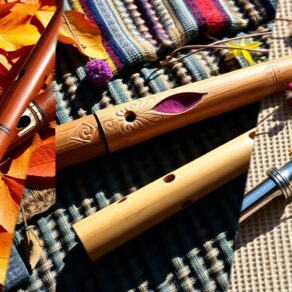To succeed as a flutist, you need a well-structured daily routine. Start by setting clear practice goals and schedule dedicated time slots. Include effective warm-ups focusing on breath control and finger agility. Prepare for performances by visualizing success and developing a pre-performance ritual to calm nerves. Don't forget to balance practice with personal time; engaging with friends and family can recharge your creativity. Finally, always seek growth by experimenting with new techniques and diverse repertoires. With these strategies, you'll enhance your skills and joy in music, and soon you'll discover even more tips to elevate your journey.
Key Takeaways
- Establish a structured daily practice routine with clear objectives to enhance skill development and maintain motivation.
- Incorporate effective warm-up techniques, focusing on breath control and finger agility, to prepare for practice and performances.
- Balance practice time with personal commitments to ensure overall well-being and social engagement.
- Utilize performance preparation strategies, such as visualization and relaxation exercises, to manage anxiety and boost confidence.
- Commit to continuous learning by exploring diverse repertoire and seeking feedback from peers or mentors for growth.
Establishing a Daily Practice Routine

Establishing a daily practice routine is essential for any flutist aiming for success. It's not just about playing your instrument; it's about setting clear goals and managing your time effectively.
Begin by identifying specific objectives you want to achieve, whether it's mastering a difficult piece or improving your technique. Write these goals down and revisit them regularly to stay motivated.
Next, create a structured schedule that fits your lifestyle. Allocate specific time slots for practice each day, and treat them as you'd any important appointment. This consistency builds discipline and guarantees you make steady progress.
Don't forget to include breaks to keep your mind fresh and engaged.
As you practice, focus on quality over quantity. Short, focused sessions can be more beneficial than long, unfocused ones. Using a metronome during practice can significantly enhance your timing skills, ensuring you maintain a consistent rhythm.
Remember to track your progress and celebrate small victories along the way. This sense of achievement fosters a supportive environment for yourself, reinforcing your commitment to growth.
Techniques for Effective Warm-Ups

A solid warm-up routine is essential for every flutist, as it prepares your body and mind for practice or performance.
Start with some breathing exercises to enhance your breath control. Inhale deeply through your nose, filling your diaphragm, and then exhale slowly through your mouth. This not only calms your nerves but also primes your lungs for the demands of playing.
Next, focus on your finger agility. Play simple scales or arpeggios at a slow tempo, gradually increasing speed while maintaining accuracy. This helps build muscle memory and guarantees your fingers are ready to tackle more complex pieces.
Incorporate long tones into your warm-up routine. Choose a note and hold it for as long as possible while maintaining a steady pitch. This improves your tone quality and breath support.
You can also add interval exercises, which challenge your finger dexterity and enhance your overall technique. Additionally, practicing scales and arpeggios during your warm-up reinforces your fluency and dexterity on the flute.
Strategies for Performance Preparation

After you've completed your warm-up routine, it's time to focus on how to prepare for your performance. Start by setting clear goals for what you want to achieve during your performance. This will give you a sense of direction and purpose.
Next, practice mindful visualization. Picture yourself on stage, confidently playing your flute. Imagine the sounds, the audience's reactions, and the joy of sharing your music. This technique not only boosts your confidence but also helps reduce performance anxiety.
Remember to rehearse in conditions similar to the actual performance environment. If possible, practice in the venue or a similar space to get comfortable.
Additionally, incorporate breathing exercises to manage anxiety. Deep, controlled breaths can center your mind and calm your nerves. Engaging in relaxation exercises can further help regulate your heart rate and reduce anxiety.
Finally, develop a pre-performance routine that helps you feel grounded and focused. Whether it's a favorite piece or a quick stretch, find what works for you.
Embrace the energy of your audience; remember, they're there to support you. With these strategies, you'll be well-prepared to deliver a memorable performance. You've got this!
Balancing Practice and Personal Life

Finding the right balance between practice and personal life can feel challenging, but it's vital for your overall well-being and artistic growth. Effective time management is key in achieving this balance. Here's a simple way to structure your week:
| Practice Focus | Social Commitments |
|---|---|
| Monday: Scales | Dinner with Friends |
| Tuesday: Repertoire | Family Game Night |
| Wednesday: Technique | Volunteer Activity |
| Thursday: Performance | Music Group Meeting |
| Friday: Review | Movie Night |
Set aside dedicated practice time while also prioritizing social commitments. By creating a structured plan, you can guarantee that your flutist journey doesn't overshadow your personal connections. It's important to stay committed to your craft, but don't forget to enjoy life outside the practice room. Remember that maintaining consistent practice is essential for progress and habit formation.
Engage with friends or family after a focused practice session; it'll help you recharge and inspire your music. Remember, striking a balance allows you to grow as both a musician and a person. Embrace these moments, and you'll find that your artistry flourishes alongside your relationships.
Continuous Learning and Growth

Continuous learning and growth are essential for any flutist enthusiastic to elevate their musical journey. Embracing new challenges not only enhances your skills but also keeps your passion alive.
To foster continuous improvement, consider these strategies:
- Mastering improvisation: Experiment with different styles and genres, allowing your creativity to flourish. This skill can transform your performances and boost your confidence.
- Exploring repertoire: Immerse yourself in diverse pieces, from classical to contemporary. This broadens your understanding of music and helps you connect with fellow musicians who share your interests.
- Seeking feedback: Collaborate with peers or mentors who can provide constructive criticism. Their insights can guide your progress and refine your technique.
- Attending workshops and masterclasses: Engage with experts and fellow flutists to learn new techniques and ideas. These experiences can inspire and motivate you on your journey. Additionally, incorporating advanced flute techniques into your practice routine can significantly enhance your overall performance quality.
Frequently Asked Questions
What Type of Flute Should a Beginner Start With?
When starting your flute journey, consider a student flute designed for beginners.
Brands like Yamaha, Gemeinhardt, and Armstrong offer reliable options that focus on ease of play and durability.
These flutes typically have a closed hole design, making it easier for you to learn and develop your technique.
Investing in a quality beginner brand will set you up for success and help you feel more confident as you explore your musical passion.
How Do I Choose the Right Flute Teacher?
Choosing the right flute teacher can feel intimidating, but it's essential for your musical journey.
Start by considering teacher qualifications—look for someone with experience and a solid background.
Next, observe their teaching styles; do they inspire and encourage you? A good teacher should make you feel comfortable and excited to learn.
Don't hesitate to try a few lessons with different instructors to find the one that truly resonates with you. You deserve that connection!
What Are Common Mistakes to Avoid While Practicing?
When you practice, it's essential to focus on common mistakes that can hinder your progress.
First, watch out for intonation issues; consistently check your pitch using a tuner.
Next, pay attention to rhythm problems; use a metronome to maintain steady timing.
Break your practice into manageable sections, and don't rush through them.
By addressing these pitfalls, you'll build a solid foundation and feel more confident in your playing.
Keep going—you've got this!
How Can I Improve My Flute Tone?
To improve your flute tone, focus on breath control and embouchure adjustment.
Start by taking deep breaths, engaging your diaphragm to support your sound.
Experiment with your embouchure by slightly adjusting the position of your lips; small changes can make a big difference.
Regularly practice long tones to develop consistency.
Remember, everyone improves at their own pace, so be patient with yourself.
Celebrate your progress, and you'll build a beautiful tone over time!
What Resources Are Best for Advanced Flute Techniques?
To enhance your advanced flute techniques, you'll find several valuable resources.
Start with advanced technique books that focus on finger agility and breath control—these will deepen your understanding.
Additionally, consider enrolling in online masterclasses, where expert flutists share their insights and provide tailored feedback.
Engaging with these resources not only sharpens your skills but also connects you with a community of passionate musicians, fostering your growth and belonging in the flute world.
Conclusion
By establishing a solid daily routine and incorporating effective warm-ups, you set the stage for success as a flutist. Remember, balancing practice with personal life is essential for your overall well-being. As you prepare for performances and embrace continuous learning, you'll find your skills—and confidence—growing. So, what's stopping you from diving into your practice today? Embrace the journey, stay committed, and watch as your passion for music flourishes!





